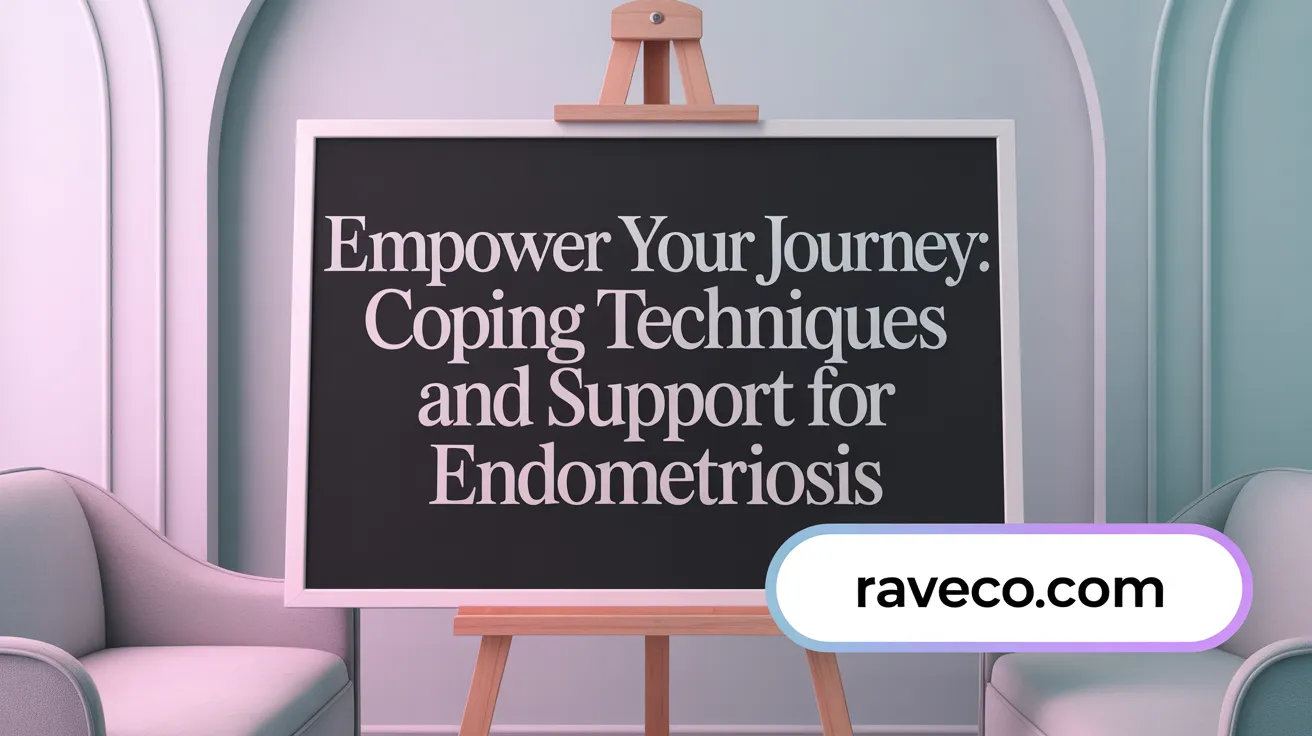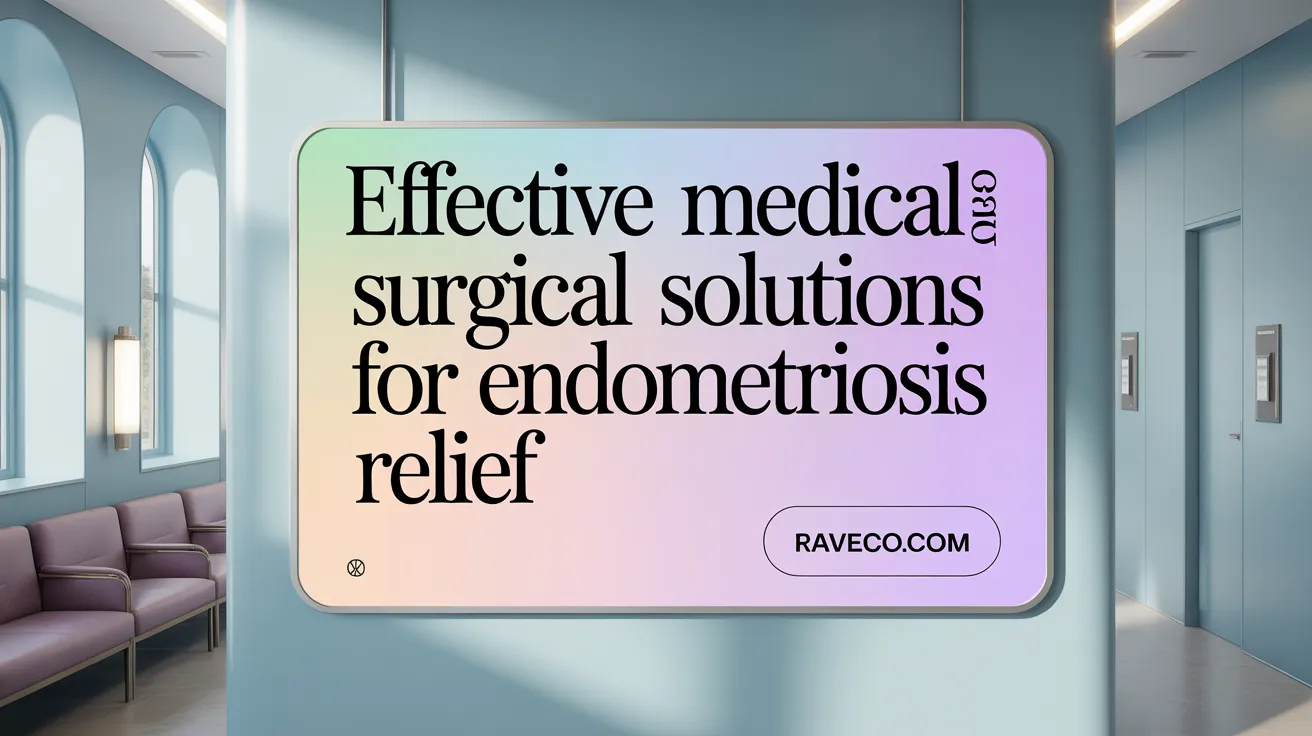Empowering Choices: The Essentials of Birth Control Counseling

Understanding Endometriosis and Its Impact on Women’s Lives
Definition and Prevalence of Endometriosis
Endometriosis is a chronic condition where tissue similar to the uterine lining grows outside the uterus. This tissue can attach to organs such as the ovaries, fallopian tubes, bladder, and even the bowel. Affecting about 1 in 10 women worldwide, it is most commonly diagnosed in women in their 20s and 30s. The condition’s exact causes remain unclear, though genetics, menstrual cycle characteristics, and immune system factors are involved.
Common Symptoms and Complications
Women with endometriosis often experience severe pelvic pain, painful menstrual cramps, heavy or irregular bleeding, pain during sex, and difficulties with bowel or bladder function. Infertility is a significant concern, affecting many women with this condition due to blockage or damage in the reproductive organs. Additional symptoms may include fatigue and pain during urination or bowel movements.
Emotional and Physical Impact on Quality of Life
Endometriosis profoundly affects women's daily lives and emotional well-being. Chronic pain, heavy bleeding, and infertility issues can lead to emotional distress, anxiety, and depression. Coping with ongoing symptoms can interfere with personal relationships, work, and social activities. The combined physical and psychological burdens underscore the importance of comprehensive care that addresses both symptom management and mental health support.
Personalized Care in Obstetrics and Gynecology: Enhancing Endometriosis Outcomes

How does personalized care impact women's health outcomes in obstetrics and gynecology?
Personalized care plays a crucial role in improving health outcomes for women by tailoring treatment plans based on each individual's medical history, symptoms, and lifestyle. For endometriosis, this involves comprehensive symptom tracking, including menstrual cycles and pain levels, which helps healthcare providers create targeted and effective management plans. By closely monitoring symptoms, providers can adjust therapies like hormonal treatments or surgery to best fit the patient's needs.
Importance of personalized care in women's health
Endometriosis symptoms and severity vary widely among women. Personalized care ensures that each patient receives an individualized diagnosis and treatment, which can include a blend of medication, lifestyle adjustments, and surgical options as appropriate. This approach supports better symptom control and reduces the physical and emotional toll of the condition.
Role of symptom tracking and individualized treatment planning
Keeping a detailed record of symptoms enables women and their healthcare providers to identify patterns and triggers. This data allows for timely adjustments in medication, self-care techniques like heat therapy or exercise, and decisions regarding surgery if necessary. Individualized treatment planning maximizes symptom relief while considering factors such as fertility desires and overall wellbeing.
Impact of patient-provider communication on treatment success
Open and honest communication fosters trust and supports shared decision-making. When patients feel heard, they are more likely to adhere to treatment plans and engage in self-care strategies. Effective dialogue also helps patients express concerns about side effects or mental health, allowing providers to integrate supportive therapies for comprehensive care.
How personalized care improves overall wellbeing and management of endometriosis
By addressing both physical symptoms and emotional health, personalized care leads to improved quality of life. Incorporating stress management, dietary guidance, and support groups alongside medical treatment empowers women to manage endometriosis proactively. In regions like Queens, NY, specialized providers offer multidisciplinary team approach in endometriosis care aligned with this personalized philosophy, ensuring women receive holistic and compassionate care.
Comprehensive Services Offered by Woman-Led Healthcare Providers in Queens, NY

What services does a woman-led healthcare provider specializing in comprehensive obstetrics and gynecology offer?
Woman-led healthcare providers in Queens, NY deliver a broad spectrum of personalized care focused on women's unique health needs across all life stages. Their services encompass obstetrics, including prenatal monitoring, childbirth support, and postpartum care to ensure healthy pregnancies and deliveries.
Routine gynecological examinations form a core part of their offerings, such as pelvic exams, Pap smears, and breast screenings designed for early detection and prevention of cancers. They expertly manage reproductive conditions like endometriosis, ovarian cysts, and polycystic ovary syndrome (PCOS), tailoring treatments to individual patients.
Minimally invasive procedures utilizing the latest technology target complex disorders, including specialized surgical interventions for endometriosis that promote quicker recovery and fertility preservation. This reflects a commitment to both effective medical outcomes and patient comfort. These procedures often include robotic-assisted surgery in gynecology, enhancing precision and recovery.
Beyond clinical treatments, these providers prioritize compassionate, woman-centered care. They offer reproductive health counseling, contraceptive management, and family planning services that empower women in their healthcare decisions. Additionally, expert guidance on menopause and osteoporosis supports women in maintaining long-term health and wellness.
This comprehensive, multidisciplinary team approach in endometriosis care addresses physical and emotional well-being, making these practices trusted resources for women seeking holistic gynecologic and obstetric care in Queens, NY.
Coping Strategies for Women Living with Endometriosis

Self-care methods including diet, exercise, and stress management
Managing endometriosis effectively often starts with self-care for endometriosis. Adopting a diet rich in fruits, vegetables, omega-3 fatty acids, and low-processed foods can help reduce inflammation and ease symptoms. Regular physical activities such as walking, swimming, or yoga promote the release of endorphins—natural pain relievers—and improve overall well-being (exercise benefits for endometriosis).
Mindfulness practices, meditation, deep breathing exercises, and cognitive behavioral therapy are proven stress management techniques for endometriosis that significantly reduce symptom severity. Ensuring proper rest and quality sleep is also vital, as fatigue can worsen pain and mental health.
Role of mental health support and counseling
Endometriosis impacts both physical and emotional health. Accessing mental health support through counseling for endometriosis patients or therapy tailored to chronic illness can improve coping abilities. Cognitive-behavioral therapy and pain-focused therapies help manage emotional distress, anxiety, and depression related to chronic pelvic pain.
Effectiveness of heat therapy and complementary treatments
Applying heat via heating pads or warm baths provides immediate relief from pelvic pain by relaxing muscles and easing cramps (heat therapy for endometriosis pain. Complementary treatments such as acupuncture, physical therapy, herbal supplements, CBD, and Transcutaneous Electrical Nerve Stimulation (TENS) can offer additional pain relief, although it is advised to consult healthcare providers before use.
Building a support network through groups and advocacy
Connecting with endometriosis support groups and advocacy organizations helps reduce feelings of isolation and empowers women. Local or online communities provide emotional support, shared experiences, and encouragement. Participating in awareness campaigns during Endometriosis Awareness Month fosters understanding and promotes research.
Importance of symptom tracking and rest
Keeping a detailed symptom and menstrual cycle calendar aids in communicating effectively with healthcare providers, allowing personalized and timely adjustments in treatment. Furthermore, recognizing pain flare-ups and allowing oneself adequate rest prevents burnout and helps maintain daily functioning.
In Queens, NY, women benefit from specialized healthcare providers offering comprehensive care plans integrating these coping strategies for improved quality of life with endometriosis.
Medical and Surgical Treatment Options for Endometriosis

Use of NSAIDs and hormonal therapies to manage symptoms
Nonsteroidal anti-inflammatory drugs (NSAIDs), such as ibuprofen and naproxen, are commonly used to reduce pain and inflammation associated with endometriosis. Hormonal therapies including combined oral contraceptives, progestins, and gonadotropin-releasing hormone (GnRH) agonists help control the growth of endometrial tissue by suppressing ovulation and menstrual cycles. These treatments aim to alleviate symptoms but do not cure the condition. For more details, see Hormonal Therapies and Treating endometriosis with medication.
Minimally invasive surgeries such as laparoscopy and excision procedures
Laparoscopy is the preferred minimally invasive surgical approach to both diagnose and treat endometriosis by excising or ablating lesions and scar tissue. This technique offers benefits such as faster recovery, less pain, minimal scarring, and preservation of fertility. Excision surgery is the gold standard for effective removal of deep infiltrating lesions and improving pain and fertility outcomes. See Laparoscopy surgery, Laparoscopic surgery for endometriosis diagnosis, and robotic-assisted surgery in gynecology for more information.
Role of hysterectomy in severe cases
In severe or refractory cases where conservative treatments fail, hysterectomy—with or without removal of ovaries—may be considered to relieve chronic pain and heavy bleeding. This is a definitive surgery but results in loss of fertility and induces menopause, and it is typically reserved as a last resort due to its significant implications. Learn more about Hysterectomy for severe endometriosis and the Role of hysterectomy.
Fertility preservation and assisted reproductive technologies
Endometriosis can impair fertility through adhesion and inflammation. Surgical removal of endometriotic tissue can enhance fertility, particularly in mild to moderate disease. For women facing infertility, assisted reproductive technologies such as in vitro fertilization (IVF) offer additional options to conceive. Fertility preservation strategies may also be discussed prior to definitive surgeries. More on Endometriosis and fertility and Fertility treatments in endometriosis.
Risks and benefits of treatments and potential symptom recurrence
Medical treatments are generally effective in symptom control but may cause side effects like hormonal imbalance and bone density loss, and symptoms often return after stopping therapy. Surgical removal of lesions can provide significant relief but carries risks of complications and does not guarantee a cure, as disease recurrence is common. An individualized treatment plan balancing symptom relief, fertility goals, and quality of life is essential, ideally coordinated by specialized healthcare providers experienced in endometriosis management, such as those in Queens, NY. Additional guidance can be found in Endometriosis Treatment Options and Endometriosis Comprehensive Care in Queens, NY. For integrated care, see the multidisciplinary team approach in endometriosis care and multidisciplinary team approach in endometriosis care.
Advanced Technologies and Multidisciplinary Approaches in Endometriosis Care

What advanced technologies and treatments are currently used in obstetrics and gynecology?
Advances in obstetrics and gynecology have transformed the management of complex conditions such as endometriosis. Modern imaging techniques, including high-resolution transvaginal ultrasound and magnetic resonance imaging (MRI), provide detailed visualization of endometrial lesions, especially deep infiltrating disease involving organs like the bowel and bladder. These imaging modalities assist in accurate diagnosis and surgical planning.
Minimally invasive surgeries, particularly laparoscopic and robotic-assisted surgery in gynecology, offer precise removal of endometrial tissue with benefits including smaller incisions, less postoperative pain, and faster recovery times. Robotic-assisted surgery enhances the surgeon's ability to perform delicate dissection and excision, which is crucial when endometriosis affects multiple pelvic organs.
How do multidisciplinary teams enhance endometriosis care?
Comprehensive endometriosis care involves multidisciplinary teams comprising gynecologists, pain management specialists, colorectal and urologic surgeons, reproductive endocrinologists, and mental health providers. This team-based approach ensures that all facets of the disease—from complex pelvic anatomy and fertility concerns to chronic pain and psychological impacts—are addressed collaboratively, improving patient outcomes. For example, NYU Langone Endometriosis Center offers such integrated care with specialists across these domains, emphasizing a multidisciplinary team approach in endometriosis care.
What integrative therapies complement traditional treatments?
Integrative therapies such as acupuncture, physical therapy (including pelvic floor rehabilitation), and complementary pain management techniques are increasingly incorporated. These approaches can alleviate pain, reduce inflammation, and improve overall quality of life alongside medical and surgical interventions. Resources on complementary therapies for endometriosis provide useful guidance.
How important is patient education and support?
Patient education is central to care, empowering women to understand their condition, manage symptoms, and participate in treatment decisions. Ongoing support services, including counseling and support groups, help address emotional challenges associated with endometriosis, fostering resilience and adherence to care plans.
Women in Queens, NY, benefit from facilities like the NYU Langone Endometriosis Center, where advanced imaging, cutting-edge minimally invasive surgeries, and multidisciplinary teams collaborate to provide personalized, holistic care tailored to each patient's needs.
Empowering Women Through Specialized Care and Support in Queens, NY
Early Diagnosis and Expert Care
Receiving an early and accurate diagnosis is crucial for managing endometriosis effectively. Queens, NY offers specialized healthcare providers trained to recognize symptoms early and employ advanced diagnostic tools like laparoscopy and MRI. Expert care helps tailor treatment plans to individual needs, improving symptom control and fertility outcomes.
Woman-Led, Compassionate Healthcare Models
Healthcare providers in Queens emphasize woman-led, compassionate care tailored to each patient’s unique experience with endometriosis. This approach ensures personalized treatment plans in a comfortable, respectful environment, addressing both physical symptoms and emotional well-being through supportive communication.
Active Patient Involvement
Women are encouraged to actively participate in managing their condition by tracking symptoms, maintaining open communication with providers, and exploring a range of treatment options—from lifestyle modifications and hormone therapies to minimally invasive surgeries. This empowerment fosters better symptom control and quality of life.
Comprehensive Local Services and Emotional Support
Queens boasts a multidisciplinary network including gynecologists, pain specialists, mental health counselors, and support groups. These integrated services provide holistic care addressing pain management, fertility concerns, and psychological health. Emotional support through counseling and community groups is vital for resilience and coping.
Accessing these specialized services locally in Queens means women with endometriosis can receive timely, coordinated care, promoting improved health outcomes and empowering them through every stage of their journey.





.png)